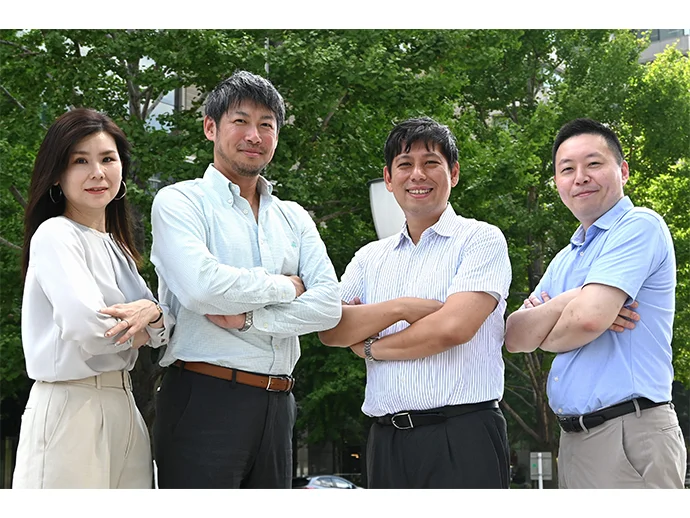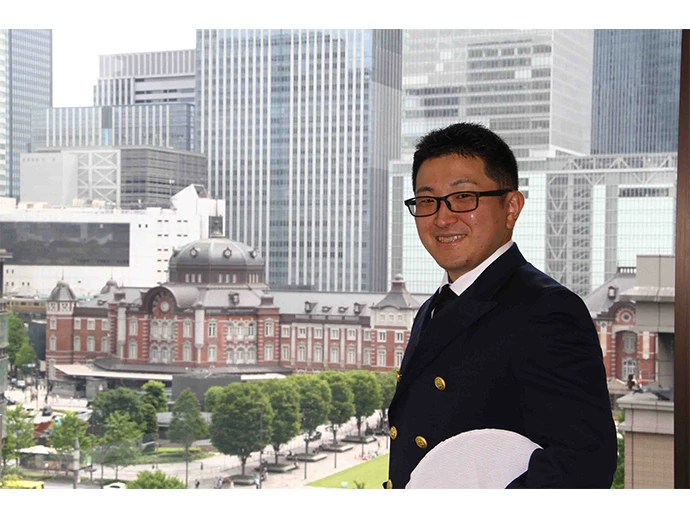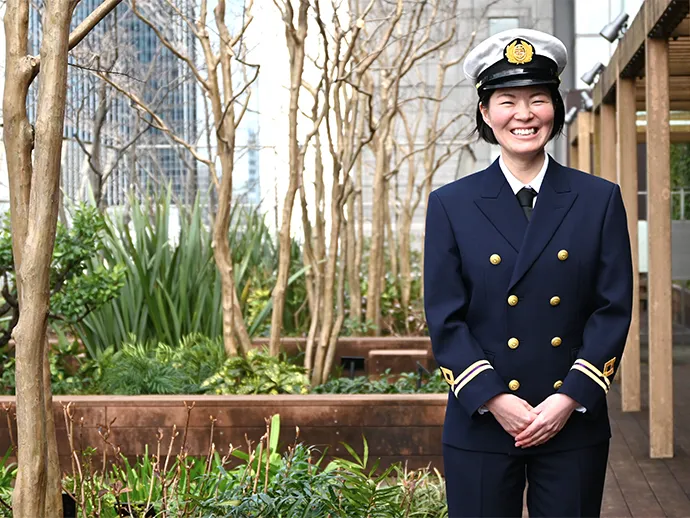Captain on Shore Duty: Applying Maritime Skills to Develop New Businesses
Released : Jun. 19, 2025
Updated : Oct. 20, 2025
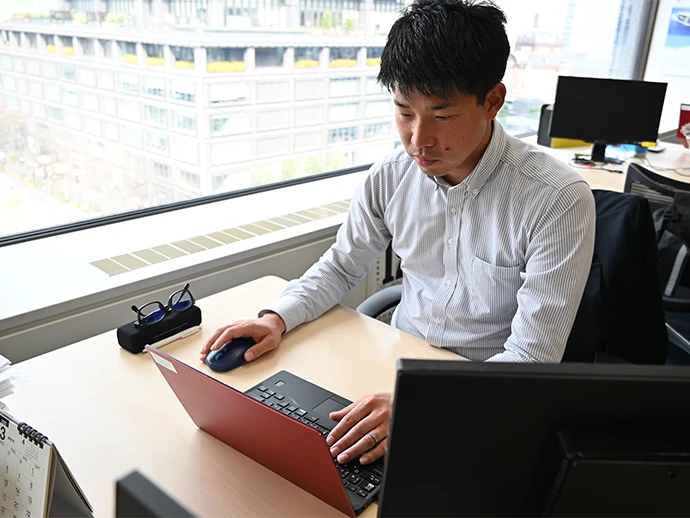
In 2023, NYK established the Ship Business Group with the goal of enhancing the added value of Japan’s maritime industries, including shipping and shipbuilding. Capt. Ryota Shindo, a member of the group, stands as the only mariner on the team — a professional who applies his onboard knowledge and experience to onshore maritime-related operations. We spoke to him about his career path and daily responsibilities.
Acquiring a Maritime License through NYK's In-House Training Program
I studied at a regular university, and it was only during my job search that I first learned about the shipping industry. Although I come from a landlocked prefecture in Japan, the concept of a "seafarer" resonated deeply with me. At NYK, marine engineers gain a broad range of experience both at sea and on land, and they have opportunities to work globally. I thought that such a dynamic role would continuously engage and fulfill someone with my temperament.
Seafarers typically come from merchant marine universities or technical colleges that specialize in seafarer training. However, NYK was quick to launch its own in-house program to help graduates from regular universities obtain a national license to serve as seafarers on ocean-going vessels. I joined the program in its second year, 2007, as one of 5 trainees.
For the first six months, I got trained at port agency offices, learning the procedures involved in vessel arrivals and departures. This was followed by six months of classroom instruction at the Maritime Technical College in Kobe. Then came onboard training: three months on domestic routes and three months aboard a sailing ship to Hawaii—a particularly enjoyable period. To obtain the maritime license, one year of sailing experience is required. Consequently, I spent another six months aboard an NYK LNG vessel operating between Indonesia and Japan.
In July 2009, I obtained my third-grade maritime officer license after passing an oral exam that covered navigation, instrumentation, meteorology, and maritime law. While it might seem challenging to master in just two years what typically takes four or five years at a merchant marine university, my deep fascination with maritime work made the process manageable and rewarding.
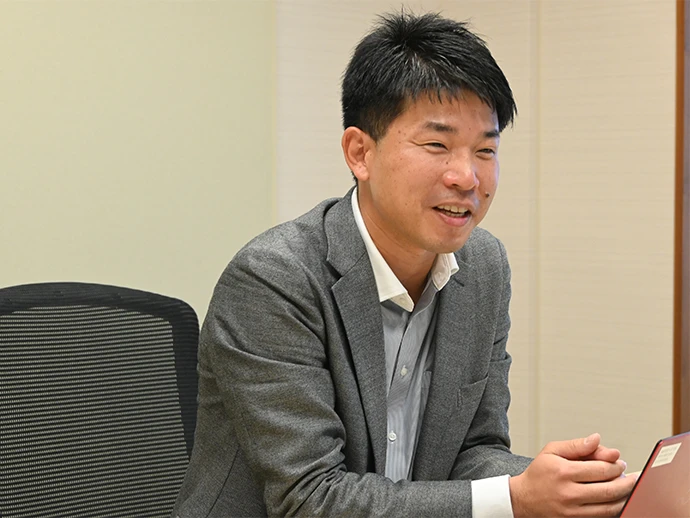
Ryota Shindo
Senior Specialist, Ship Business Group, Technical Headquarters
Captain
From Onboard Experience to Launching a New Business Unit
I started my career as a maritime officer aboard a bulk carrier operating between Japan and Australia. I also served on LNG carriers and container ships, gaining global experience. From late 2013 to March 2017, I transitioned to an onshore role for the first time, primarily concentrating on tanker inspection readiness, before returning to LNG vessels. I sailed frequently to Australia, Qatar and Oman on voyages lasting several months, and during this period, I passed the internal promotion exam to earn the title of captain.
In my second shore posting, I was assigned to the Marine Group to help establish a new department.
Although Japan once led the world in shipbuilding, China now holds 60% of the market share. Still, Japan retains extensive technical expertise and advanced technologies, including IT. This project was initiated with the goal of revitalizing Japan’s maritime industry by offering new solutions through cross-industry collaboration.
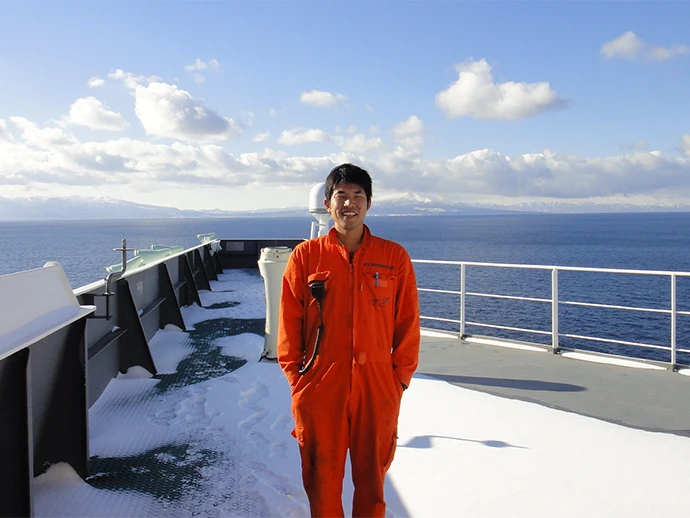
Departing Muroran in winter as a second officer on a Very Large Crude Carrier (VLCC)
Nearly 100 Company Meetings a Year, Both in Japan and Overseas
After internal coordination and preparations, the Ship Business Group was launched in April 2023. Our six-member group includes engineers experienced in negotiations with shipyards, sales staff skilled in systems, former business developers from other industries, and NYK Group company employees with sales backgrounds.
As the sole member with onboard experience, I bring the unique perspective of someone who understands real-world operations both at sea and on land. Given the group members’ diverse backgrounds, our frequent inquiries into one another’s perspectives often lead us to ask, “What does that mean?” — serving to deepen our collective understanding.
Initially, our objective centered on revitalizing Japan’s maritime industry. However, recognizing that shipping is an inherently global business — with shipbuilding, equipment manufacturing, cargo ownership, and ship management companies distributed worldwide — we have expanded our focus to energize the global maritime industry.
In pursuit of pioneering solutions, our group collaborates with partners across multiple fields. I personally meet with 80–100 companies each year.
One of my current projects involves developing autonomous navigation systems to address labor shortages on domestic coastal routes. In collaboration with groups and partner companies, we are working to reduce crew workload. Another project is to enhance remote monitoring of ship engines. While onboard engineers typically respond to alarms as issues arise, we aim to detect abnormalities early by monitoring sensor data from land, thereby enabling preventative action. We are now looking to expand this system outside the company.
Each group member is encouraged to develop new business ideas. Where current capabilities fall short, we explore new approaches — whether it's creating smoother collaboration systems with ship management companies or combining technical group company services into comprehensive solutions. Everyone is pursuing their own project.
I often travel for work. Every few months, I visit Ehime Prefecture, which has traditionally been home to many shipbuilders and ship owners and continues to be a major center of Japan’s maritime industry. I also make regular business trips to global maritime hubs such as Singapore and various cities across Europe. Last month, I was in Europe. This month, I traveled to the Philippines. As a marine-backgrounded staff at NYK, I also take part in international meetings abroad.
Whether in Japan or overseas, I usually have two or three appointments each day, typically one in the morning and one or two in the afternoon.
During domestic office days, I drop off my child at daycare and arrive at work around 9:30 a.m. NYK’s flextime policy provides the flexibility many employees, including myself, appreciate. I attend internal meetings in the morning, have lunch in the cafeteria with my colleagues, and spend the afternoon meeting with partners. I usually leave the office around 6 p.m. after summarizing the day’s activities.
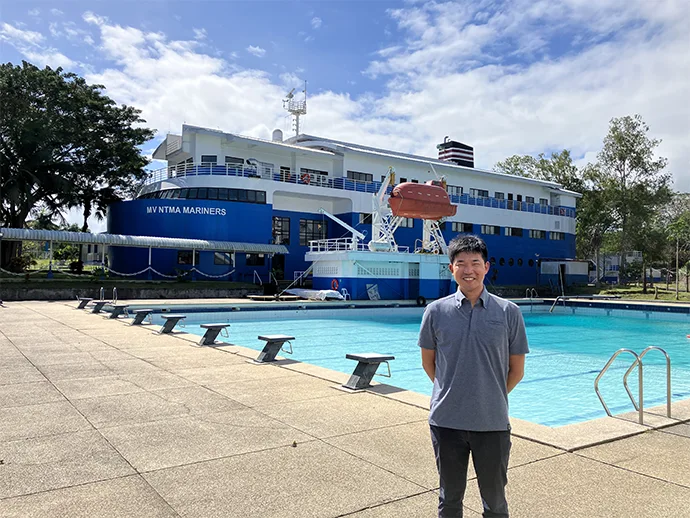
Visiting the NYK TDG Maritime Academy (NTMA) in the Philippines, jointly operated with the Transnational Diversified Group, to discuss the current status and future plans for offering to external clients the training programs NYK-Fil Maritime E-Training Inc. (NETI) provides to NYK crew. The visit also included a stop by the NETI monitoring center, which continuously collects vessel operation data and remotely monitors the condition of engine plants on SIMS-equipped ships.
Bringing All My Onboard Experience to Shore
At NYK, the role of mariner differs significantly between sea and shore. On board, safety and cargo delivery are paramount. Strict compliance with procedures is essential. On land, however, we need to take initiative — form hypotheses, test and revise them, and make proposals to stakeholders. It requires a PDCA mindset (Plan–Do–Check–Act). This current group, with its focus on developing new business opportunities, offers particularly rewarding opportunities.
Our partners in shipbuilding and cargo shipping are not “seafarers,” and my firsthand onboard experience enables me to explain what kinds of issues may arise at sea while envisioning the application of new technologies from other industries. My onboard experience, physical endurance, ability to trust teammates, understanding of stakeholders, and negotiation skills — everything I’ve accumulated — contribute to my current work.
My immediate goal is to help address social issues through the adoption of autonomous navigation. Looking further ahead, I hope we can become an agile organization that quickly responds to changes in global shipping and innovates new business models for maritime transport.
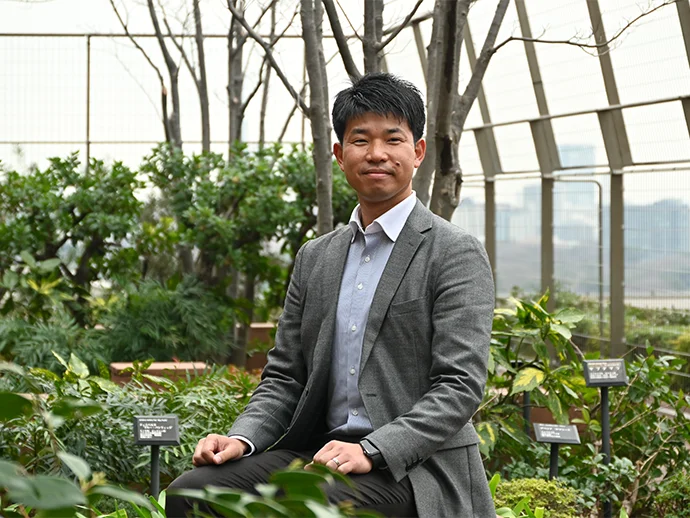
Developing new businesses, envisioning the future of maritime work from ashore
A Few Days in the Working Life of Ryota Shindo
Monday
09:00 – Online meeting with MarcoPay, an NYK-related company in the Philippines, to discuss business progress
10:00 – Internal discussion about the Ship Business Group’s future
12:00 – Lunch
13:00 – Participation in internal training
14:00 – Early departure in preparation for long-distance travel
Tuesday – Travel from Tokyo to London
Wednesday – Meetings with several ship management companies in London
Explain the department’s vision and hold discussions
Dinner with ship management company stakeholders
Thursday – Travel from London to Hamburg
